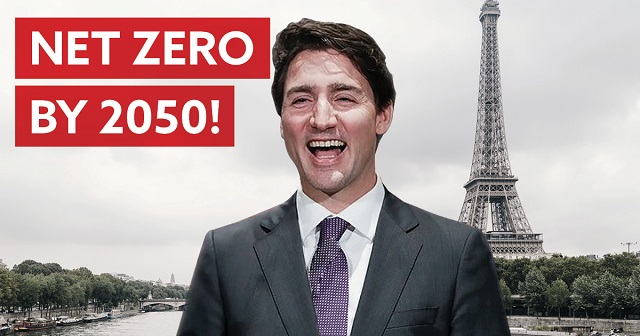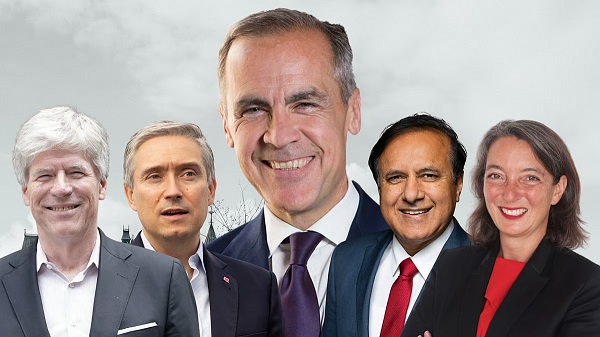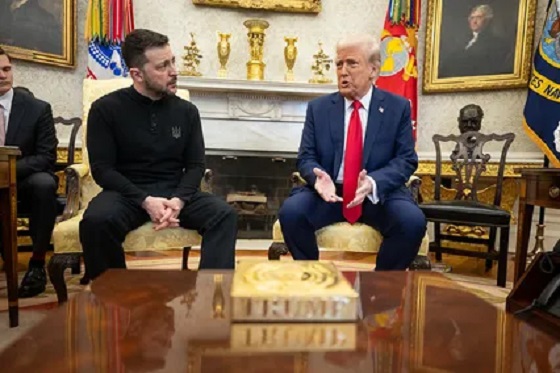Dan McTeague
Call out ‘net zero’ for what it is, a scam

From Canadians for Affordable Energy

Net Zero emissions by 2050. Have you heard this line? It is increasingly hard to miss. Every trendy business, bank, corporation and government boasts about their commitment to it. But what exactly do they mean by it?
In short, Net Zero by 2050 means our country either emits no greenhouse gases or offsets whatever it does emit through measures such as buying carbon credits or investing in carbon capture technology.
Net Zero has been a central project of groups such as the World Economic Forum, the United Nations and other globalist institutions. They’ve spent the past several years pressuring governments around the world to commit to Net Zero and to make those commitments legally binding, so it will be difficult for elected officials to roll them back in the future.
That’s what’s happening here in Canada. This has been a major priority for Justin Trudeau. The Liberals have spent years championing the push to Net Zero, mandating it by law in 2021.
But law or not, Net Zero isn’t actually going to happen.
It is a ludicrous goal, in part because achieving it would be unimaginably expensive. So expensive, in fact, governments the world over don’t even attempt to estimate the total cost. Whenever they’re asked, they just say “the cost of doing nothing will be higher.” But if they don’t know how expensive their own plan is, how on earth could they know that it would be cheaper than not doing it?
External estimates place the cost for Canada alone somewhere in the neighborhood of $2 trillion. That number is so staggering it is impossible to fully comprehend it. It is more than our nation’s entire Gross Domestic Product! Look at it this way — that is the equivalent of spending $1 a second for 63,417 YEARS.
But the fact Net Zero will ultimately fail doesn’t mean attempting it isn’t going to negatively affect your daily life. It will.
Under the umbrella of Net Zero you’ll find,
- Carbon taxes
- Clean Fuel Standards
- Just Transition
- Emissions caps
- Cancelled pipelines
- Electrification strategies
- Gas and diesel car bans
- Electric vehicle subsidies
- Costly building codes
- Curtailed food production
The list goes on and on.
But beyond the economic impact and the personal hardship, we must remember the end game of this Green Agenda isn’t really about reducing carbon emissions. No, it is much more insidious than that.
At the heart of this Net Zero movement is a desire to fundamentally change our economy and way of life. They are looking for a complete transition from the economy that has made Canada the great nation that it is.
“You will own nothing and be happy.” Remember those words attributed to Klaus Schwab, head of the World Economic Forum (WEF)? Well take those words to heart, because he means it.
The implications of Net Zero are broad and overreaching. And they will have the effect of fundamentally affecting our quality of life.
It will make energy more expensive. It will raise the cost of everything. It will make us less competitive in the global economy, especially against countries such as China because, you will not be surprised to learn, China has not signed on to this suicide pact. (But they are keen for other countries to stifle their economy in pursuit of this absurd goal, not least because they produce 70% of the world’s solar panels.)
Net Zero regulations, policies and mandates are a direct assault on affordable energy, and an affordable way of life. That is the goal of the Green agenda, and if they have their way, Canada, its standard of living and its way of life will suffer.
Net Zero is a scam.
Dan McTeague is President of Canadians for Affordable Energy
Automotive
Canada’s EV house of cards is close to collapsing

 By Dan McTeague
By Dan McTeague
Well, Canada’s electric vehicle policies are playing out exactly as I predicted. Which is to say, they’re a disaster.
Back in November, in the immediate aftermath of Donald Trump’s re-election, I wrote in these pages that, whatever else that election might mean for Canada, it would prove big trouble for the Justin Trudeau/Doug Ford EV scam.
The substance of their plot works like so: first, the federal and provincial governments threw mountains of taxpayer dollars in subsidies at automakers so that they’d come to Canada to manufacture EVs. Then Ottawa mandated that Canadians must buy those EVs — exclusively — by the year 2035. That way Ford and Trudeau could pat themselves on the back for “creating jobs,” while EV manufacturers could help themselves to the contents of our wallets twice over.
But the one variable they didn’t account for was a return of Donald Trump to the White House.
Trump had run on a promise to save America from their own back-door EV mandates. Though Kamala Harris had denied that any such mandates existed, they did, and they were founded on two acts of the Biden-Harris administration.
First, they issued an Executive Order setting significantly more onerous tailpipe regulations on all internal combustion engine (ICE) vehicles, with the explicit goal of ensuring that 50 percent of all new vehicles sold in America be electric by 2030.
Second, they granted California a waiver to make those regulations more burdensome still, so that only EVs could realistically be in compliance with them. Since no automaker would want to be locked out of the market of the most populous state, nor could they afford to build one set of cars for California (plus the handful of states which have — idiotically — chosen to align their regulations with California’s) and another set for the rest of the country, they would be forced to increase their manufacture and sale of EVs and decrease their output of ICE vehicles.
Trump’s victory took Canada’s political class completely by surprise, and it threw a spanner into the workings of the Liberals’ plan.
That’s because there just aren’t enough Canadians, or Canadian tax dollars, to make their EV scheme even kinda’ work. Canada’s unique access to the world’s biggest market — America — was a key component of the plan.
After all, vehicles are “the second largest Canadian export by value, at $51 billion in 2023, of which 93 percent was exported to the US,” according to the Canadian Vehicle Manufacturers Association, and “Auto is Ontario’s top export at 28.9 percent of all exports (2023.)”
It further depended on Americans buying more and more EVs every year. But since, when given a choice, most people prefer the cost and convenience of ICE vehicles, this would only work if Americans were pushed into buying EVs, even if in a more roundabout way than they’re being forced on Canadians.
Which is why the plan all began to unravel on January 20, the day of Trump’s inauguration, when he signed Executive Order 14154, “Unleashing American Energy,” which, among other things, rescinded Joe Biden’s pro-EV tailpipe regulations. And it has continued downhill from there.
Just last week, the US Senate voted to repeal the Biden EPA’s waiver for California. Not that that’s the end of the story — in the aftermath of the vote, California governor Gavin Newsom vowed “to fight this unconstitutional attack on California in court.” (Though don’t be surprised if that fight is brief and half-hearted — Newsom has been trying to leave his lifelong leftism behind recently and rebrand as a moderate Democrat in time for his own run at the White House in 2028. Consequently, being saved from his own EV policy might only help his career prospects going forward.)
But it’s worth noting the language used by the Alliance for Automotive Innovation, which represents car companies like Toyota, GM, Volkswagen and Stellantis (several of whom, it should be noted, have received significant subsidies from the Liberal and Ford governments to manufacture EVs), which said in a statement, “The fact is these EV sales mandates were never achievable.”
That’s worth repeating: these EV sales mandates were never achievable!
That’s true in California, and it’s true in Canada as well.
And yet, our political class has refused to accept this reality. Doug Ford actually doubled down on his commitment to heavily subsidizing the EV industry in his recent campaign, saying “I want to make it clear… a re-elected PC government will honour our commitment to invest in the sector,” no matter what Donald Trump does.
Except, as noted above, Donald Trump represents the customers Doug Ford needs!
Meanwhile, our environmentalist-in-chief, Mark Carney, has maintained the Liberal Party’s commitment to the EV mandates, arguing that EVs are essential for his vacuous plan of transforming Canada into a “clean energy superpower.” How exactly? That’s never said.
These are the words of con artists, not men who we should be trusting with the financial wellbeing of our country. Unfortunately, in our recent federal election — and the one in Ontario — this issue was barely discussed, beyond an 11th-hour attempted buzzer-beater from Pierre Poilievre and a feeble talking point from Bonnie Crombie about her concern “that the premier has put all our eggs in the EV basket.”
Meanwhile, 2035 is just around the corner.
So we can’t stop calling attention to this issue. In fact, we’re going to shout about our mindless EV subsidies and mandates from the rooftops until our fellow Canadians wake up to the predicament we’re in. It took some time, but we made them notice the carbon tax (even if the policy change we got from Carbon Tax Carney wasn’t any better.) And we can do it with electric vehicles, too.
Because we don’t have the money, either as a nation or as individuals, to prop this thing up forever.
Dan McTeague is President of Canadians for Affordable Energy.
Business
The Liberal war on our cost of living lives on


Well, the election is over, and it turns out that I was right to be sceptical of the polls. Polling which showed collapsing support for the Conservative Party, which I said over and over didn’t track with what I was seeing on the ground, was clearly wrong. In fact, the Conservative Party increased their share of the vote by more than 7 points, breaking 40% for the first time since 1988, while picking up 23 seats in parliament.
That kept the Liberals to a minority government — something the pollsters were definitely not predicting — and they only did as well as they did because the Bloc Québécois lost ground and the NDP were absolutely decimated.
For this we have Donald Trump to thank, and his unprecedented intervention in our election. Not to mention Canadian boomers, who as a group ranked Trump as the most important issue in this election, and “Making Canada a better place to live” as their least important issue, just behind “Growing the Economy” and making life more affordable.
They’ve made their money, after all. They’ve built up tremendous equity in their homes. And it just made them feel good to vote in a way that they thought would make Donald Trump mad. (Not that it did.)
We are now seeing a rising generation of younger adults who will be the first to lose ground as compared to their parents since the Great Depression. And why is that? Because the Baby Boomers decided to vote to reward those politicians whose policies have been, and will continue to be, a direct assault on the Canadian cost of living.
Carney’s government will double down on the worst policies of the Trudeau era. He is, after all, the Apostle of Net-Zero.
That means doubling down on carbon taxation, especially in the form of the Industrial Carbon Tax, which will hurt existing businesses and discourage others from getting off the ground. And if he sees an opportunity to go back to charging the Consumer Carbon Tax — remember that it remains on the books — he will do that as well.
It also means continued electric vehicle mandates. Many Canadians remain ignorant of the fact that the Trudeau Liberals banned the sale of new internal combustion engine (ICE) vehicles, beginning in 2035, just ten years from now. It took some prodding, but the Conservatives vowed to scrap that mandate.
Now it will remain in effect, and that means higher priced gas-and-diesel driven cars in the near term, as Canadians start to process the fact that they won’t be able to buy them soon. It will mean eventually being forced to buy even more expensive EVs and, if nothing changes, without government support, as the federal EV subsidy program ran out of money months ago.
Meanwhile, prepare for every story about an auto company bailing on commitments to build electric vehicles in Canada to feel like a crisis. Those agreements were negotiated at a time when decision makers assumed that Donald Trump would lose his second bid for the White House, and Americans would have EVs forced on them as well.
In that climate, it seemed like a great idea to accept the mountains of taxpayer dollars being offered to automakers by Justin Trudeau and Doug Ford. But without the American market, doing so makes much less business sense. Even with Doug Ford bellowing that he’s going to “hold them accountable” and force them to “continue manufacturing automobiles here in Ontario!”
And it further means that the Trudeau government’s war on pipelines will now become the Carney government’s war on pipelines.
Remember, while campaigning just a few weeks ago, how Carney went to Edmonton and proclaimed his intention to:
Make Canada “the world’s leading energy superpower,”
Invest in our “natural strengths and ensure our economic sovereignty,” and
fast-track “projects of national interest,”
while acknowledging that,
“any major energy project that comes from this great province is going to pass the boundaries of other provinces?”
His clear implication was that he intended to change course from his predecessor, to facilitate the building of pipelines, perhaps to revive Energy East, and to do so even over the objections of Quebec.
Suffice it to say, we didn’t believe a word of it. And now we see we were right not to do so, as we’ve just seen two of Carney’s ministers — Steven Guilbeault and Dominic LeBlanc — throw cold water on the idea that the Carney government would support new pipeline projects.
That’s because the activists who continue to run our country would prefer the pat on the head they get from the Davos brigade than to support the backbone of our economy, the natural resource sector, upon which Canadian jobs, energy affordability, and our overall cost of living rests.
All this means, of course, is that our work is not done. Our fight to protect the Canada we all know and love, where regular people can do honest work, buy a house, raise a family and live comfortably, goes on.
As disappointing as the outcome of this election was, it is just a setback. More and more people are hearing our message. We’re already seeing signs of buyer’s remorse among Carney voters. And, to put it bluntly, if something can’t continue on one way forever, it won’t. Which is to say, we’re going to have to change course sometime. The sooner, the better.
So, to borrow a phrase, Elbows Up.
Dan McTeague is President of Canadians for Affordable Energy.
-

 International2 days ago
International2 days agoIsrael’s Decapitation Strike on Iran Reverberates Across Global Flashpoints
-

 Alberta2 days ago
Alberta2 days agoPunishing Alberta Oil Production: The Divisive Effect of Policies For Carney’s “Decarbonized Oil”
-

 Alberta2 days ago
Alberta2 days agoAlberta Premier Danielle Smith Discusses Moving Energy Forward at the Global Energy Show in Calgary
-

 conflict2 days ago
conflict2 days agoIran nuclear talks were ‘coordinated deception’ between US and Israel: report
-

 Energy2 days ago
Energy2 days agoCanada is no energy superpower
-

 Fraser Institute2 days ago
Fraser Institute2 days agoLong waits for health care hit Canadians in their pocketbooks
-

 conflict1 day ago
conflict1 day agoOne dead, over 60 injured after Iranian missiles pierce Iron Dome
-

 Health2 days ago
Health2 days agoJust 3 Days Left to Win the Dream Home of a Lifetime!






